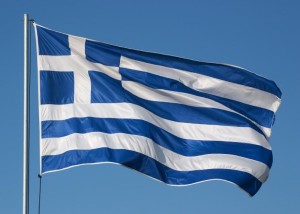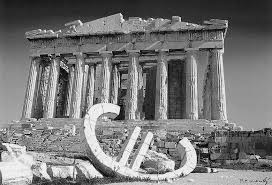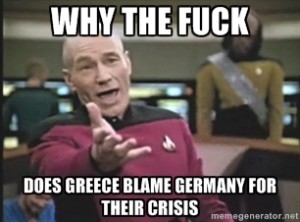Podcast: Play in new window | Download
Please click above to listen to full interview.
 In the first podcast with Mihalis, we discussed the excessive size of the Greek government, and the challenges and opportunities of entrepreneurship during the Greek crisis. During that same conversation Mihalis went on to discuss with me his solutions for Greece. He envisions a radically strengthened European Union, in which the Greek state withers in favor of more unified control from a federal Europe. Combined with that, ideally, he imagines local politics still under Greek control. Finally, and interestingly to me, Mihalis spoke about his father, a prominent businessman who took over as mayor of Thesssalonika, Greece’s second largest city.
In the first podcast with Mihalis, we discussed the excessive size of the Greek government, and the challenges and opportunities of entrepreneurship during the Greek crisis. During that same conversation Mihalis went on to discuss with me his solutions for Greece. He envisions a radically strengthened European Union, in which the Greek state withers in favor of more unified control from a federal Europe. Combined with that, ideally, he imagines local politics still under Greek control. Finally, and interestingly to me, Mihalis spoke about his father, a prominent businessman who took over as mayor of Thesssalonika, Greece’s second largest city.
Mihalis: I have many radical views. I don’t want to, you know, take them public yet.
You know Greece can, as it did in the 18th century, the Greek ideal, the Greek nationalism. Greeks were used by the European nationalists in the 18th century to create the nation state. In many ways you know the ideas of democracy, a nation that creates its own state, it was formed – it was inspired – by Greek ideals. And now there’s a second opportunity in which Greece can become the, an example of deeper European integration. With loss of sovereignty, national sovereignty. Because at the end of the day the solution is very simple but no one wants to tell it like it is. You have to sell assets. And it’s not very easy to do. It’s not very easy, but it’s not too hard to do, if you want to do it.
Politicians are afraid that if anyone’s going to say that, they’re going to be blamed for being traitors or whatever.
Mike: have Greeks benefited from unification with the rest of Europe?
Mihalis: Of course! That goes without saying. Not only because of the level of standard of living, it’s also a question of giving us access to a much larger market. It’s become a lot easier than before. It is made tourism a lot easier – more transparent, more efficient. We think about Greece as basically three things to offer. Shipping, which is a main area of excellence in the world; Tourism – we have good real estate; and the products that this real estate produces: good wines, olive oil – good stuff to eat because it’s a blessed place.
And these things have become more accessible with the euro than before. Of course, they become more expensive as well because in Greece we didn’t have a good adaptation. So when we did switch from the Drachma to the Euro, there was a hidden inflation that really ravaged society.
Mike: As you know, my parents vacation in Greece and they’re the classic tourist – for a month a year they spend their retirement money in Greece. But it got about twice as expensive when they joined the Euro. As my mom has worried to me about “what happens if they leave the euro?” I said “that is something you should look forward to. If they’re back in Drachma everything is half price again!” Which is the way it was when they first were going to Greece. From a balance of payments, or tourism perspective, shouldn’t they just leave the euro?
I know you disagree, but I’m trying to play devil’s advocate a bit.
Mihalis: I don’t disagree, it’s more a question of a better remedy. It really depends on how you assess the symptoms. If you have to amputate you have to amputate. Leaving the euro for Greece would be tantamount to an amputation. It’s something that’s really wrong, if it’s the only way to save the patient is by cutting off his arm. I still feel there are other remedies. Although I’m a pessimist by nature I still hope that there are some healthy forces in Greece that can team up with more visionary – more powerful forces in Europe – for deeper integration because there are more benefits than disadvantages to deeper integration overall, for the whole.
My radical view is that, if you had Greece lose part of its sovereignty so it could be the experiment of European integration. It might be unrealistic or utopia what I’m saying but, I don’t see any other way out. Because if you don’t create some radical changes, in the way the political system works and in the way culture affects self-government, it’s not going to work. So you’re right. There’s no reason to help, so kick them out. Let them not be part of our problem. And whoever has connections to Greece… Maybe let the tourists go there, and find the Drachma was cheaper and that’s it.
But there are two forces inside Greece that are still fighting since the inception of the state in 1821. It’s between
- Modernity and Westernization, versus
- Orientalism, and Backwardness, and no change.
It’s kind of like the Euro is a conviction, a belief, that we could be more modernized. We can be more close to what Europeans and the West expect us to be.
The most admirable thing about the US – and that is why the US has become so strong – is that you have a local government which can take care of things efficiently, and then you have a federal government that deals with the outside and inside whole of the body. In Europe you could take that example. Greece could already have institutions to run regional governments that could fertilize or be pollinated by European experts, people who run things well abroad, take best practices. The problem is we don’t have the best practice rule; You call in someone who has made it in some way, who succeeded in doing something, and really try to make it work. And then you have a blended society that has a common goal in mind which is to make it work.
MIHALIS ADVOCATES FOR RETAINING LOCAL GREEK CONTROL FOR CERTAIN THINGS LIKE CITIES, BUT CEDING SOVEREIGNTY TO THE EUROPEAN AUTHORITIES OVER BANKS, BUDGETS, AND BORDERS. THE LOCAL CONTROL ISSUE IS PARTICULARLY INTERESTING WITH MIHALIS BECAUSE HIS FATHER GIANNIS, A WELL-KNOWN BUSINESSMAN, RECENTLY BECAME THE MAYOR OF THESSALONIKA, GREECE’S SECOND LARGEST CITY. GIANNIS IS A KIND OF ANTI-POLITICIAN, WILLING TO SHAKE UP THE STATUS QUO TO CHANGE OLD BAD BEHAVIORS. I ASKED MIHALIS IF HE THOUGHT HIS FATHER WOULD BE DRAFTED TO BECOME PRESIDENT OF GREECE.
Mihalis: There’s been a lot of talk about it in Greece. Writers and journalists and many people have proposed, have just tossed his name as a potential independent guy that could come and sort of create a stable platform on which different forces can be synthesized. But I think he knows, he’s aware of his limitations and he always wants to focus on his scale. And his scale is at the city level and I think he is committed to that. You know he didn’t run into politics for the power trip. I think he ran because he felt that he could offer and do and make a difference at the city level. I don’t think he could make that difference at the national level.
But I think he’s an example of what I’m talking about. The global/local combination where you can have people like him who fight corruption who fight this venality built into the parliamentary system in Greece. Who have run successfully a business, who can fire people at the local level and hopefully improve things at the local level which are relevant to the people in their everyday life. Then you can have people of much larger magnitude that can run the larger federal institutions of Europe.
For example the immigration problem is not a Greek problem, it’s a European problem. Instead of sending an army to Afghanistan, why don’t we have an army that actually goes out to Greece’s frontiers because these are actually Europe’s frontiers. Just an example. Why have 6% of Greece’s GDP being squandered in armaments? For God sakes! Who are we scared of anymore? Turkey? Why is Turkey going to invade in the Greek islands? Why are we afraid of the Russians anymore and we’re going to keep a big standing army in Greece which is useless anyway? It’s money used for corruption with German suppliers of arms and big politicians facilitating the sales. We’ve seen it. Where the big money is it should be federal. I’m not saying that you don’t have corruption at the large scale in the US or another federal system but I think you can put checks in place that are more transparent, and more rational, more systematic.
If European leadership could rely on people like my father at the local level to keep people happy in their everyday life, and they can then run macro-economics, to stabilize economies and create a little bit of a new a new growth model.
Mike: My impression is after reading New York Times profile of your father that he’s the type of person that if he was in the United States and we were going through the crisis that Greece is going through, he would be immediately drafted as a leading contender to run the country. At least the United States, everybody loves the anti-politician. And the guy who just, practically, gets it done. For 20 years that I’ve known you, I know your father’s never been involved in politics. And yet here he suddenly shows up running the second largest city. It’s fascinating to me.
Mihalis: Yeah but he was always, always involved in collective affairs. He always cared about the collective. He ran for the Communist Party eight years ago. In the local politics. My mother had cancer, I had kicked him out from the office when I took over the business with my brother. And he needed to do something. So he said okay I’m going to offer what I have of my time to local politics.
He ran with the Communist Party because he didn’t believe in what the big parties were doing. Because the big parties were basically reshuffling the cards. Exchanging votes for jobs. And the Communists never had power. So he wanted to, say, be clean. Of course he didn’t really share the dogma of Communism. His ideology is basically “you care for the guy next to you.”
He always you know when he was a big businessman they used to call him the “Red Industrialist” because he was helping the suppliers or vineyard growers establish their own vineyards, estates, and wineries and brands. So he basically undermined his own power. But he knew that that was an evolutionary stage, that his road was to encourage, rather than be opposed to it. He knew it was going to happen anyway. I mean there were 50 wineries in Greece 30 years ago and now there are 500. And there might be even some more. Small-scale mom-and-pop operations like in Italy and France. So Greece is becoming more Europeanized. It hasn’t been a straightforward road but it’s happening.
Mike: MIHALIS, MY PHILOSOPHER FRIEND, CONCLUDED OUR DISCUSSION BY TALKING ABOUT WHAT GREECE MEANS TO EUROPE, AND WHAT EUROPE MEANS TO GREECE.
Mihalis: I do think Greece has always played inspirational role. Greece could become the model for the post-nation-state Europe. If you think about it, since the imposition of the King in France until today we’ve run on the same model. Two world wars, European unification model, using the paradigm of the nation state. And now we see the need for a more multilateral kind of model. And Europe has a lot to learn I think both from China and the US as to how a more pluralistic federal system can be established. And Greece would be the hardest place to run it. If you can do it in Greece you can easily do it in any other country. For the cultural reasons I mentioned, because Greece is also a very Oriental country deep down. It’s not part of the homogeneous core group of Europe.
Yes, from an economic point of view, exiting the euro would be a short-term good solution to the crisis. But it would signify, and it would imply, a sort of refutation of Europeanism and of what Greece could become in the future. So I would like to hope and insist and keep fighting for more European success on Greek soil. Because Europe – what Europe stands for – is something I believe exemplifies the highest values of human societies today. The combination of achievement in terms of social organization and balance between society and the individual is really coveted. It’s really envied by the rest of the world. And I would hate to lose that. I would want that for Greece.
But maybe it’s not meant to be. Maybe Greece has to remain sort of an oddball. It takes a little bit of social engineering to get there. And right now I’m not occupied with this. I’m trying to sell some wine. That’s my contribution to the problem.
Post read (3543) times.







